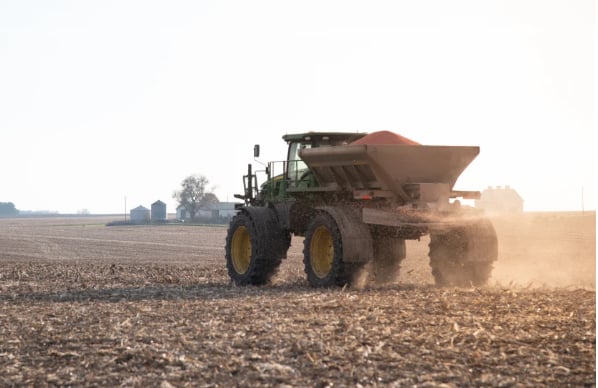November 25, 2025 | 15:14 GMT +7
November 25, 2025 | 15:14 GMT +7
Hotline: 0913.378.918
November 25, 2025 | 15:14 GMT +7
Hotline: 0913.378.918

The tariffs on Canadian imports are particularly concerning for the U.S. fertilizer industry.
The Trump administration implemented 25% tariffs on Canadian and Mexican imports beginning Saturday, Feb. 1, according to White House Press Secretary Karoline Leavitt.
Canada and Mexico are the United States’ first and third largest suppliers of agricultural products, according to USDA’s Economic Research Service, averaging $30.9 billion and $25.5 billion in 2017-21, respectively.
At the 2023 Minnesota Ag & Food Summit , Minnesota Agriculture Commissioner Thom Petersen said the Minnesota-Canada agricultural trade is a strong and balanced partnership that both sides wanted to see grow.
“I can’t tell you how important that relationship with Canada is," he said.
According to the U.S. Census Bureau, Minnesota imported $955 million in agricultural products from Canada in 2022, including $140 million in live bovine animals, $110 million in oats, $56 million in baked goods, $52 million in live pigs and $50 million in wheat and meslin.
The tariffs on Canadian imports are particularly concerning for the U.S. fertilizer industry.
The U.S. relies on imports for over 95% of its potash fertilizer needs, with nearly 90% of that coming from Canada, according to data from the USDA. Canada also supplies U.S. growers with over 8% of its nitrogen fertilizer needs, accounting for 25% of U.S. nitrogen fertilizer imports.
A disruption to the U.S.-Canadian trade relationship like the imposed tariffs will have “significant ripple effects" not just for farmers but also for the broader food supply chain and ultimately the prices consumers pay at the grocery store, according to The Fertilizer Institute, the nation’s leading voice of the fertilizer industry with roots dating back to 1883.
A disruption to the U.S.-Canadian trade relationship like the imposed tariffs will have “significant ripple effects" not just for farmers but also for the broader food supply chain and ultimately the prices consumers pay at the grocery store, according to The Fertilizer Institute, the nation’s leading voice of the fertilizer industry with roots dating back to 1883.
“Given their effects on the broader farm economy, TFI urges the Trump Administration to exempt Canadian potash and other fertilizers from the tariff order," Rosenbusch said. “Especially as we approach the critical time of spring planting where nutrient delivery and application are essential for the harvests that fill American’s dinner tables with abundant and affordable food."
In his statement released shortly after the tariffs announcement by Trump, Rosenbusch said The Fertilizer Institute “stands ready to collaborate with the Trump Administration to spur growth in the fertilizer industry."
“Potash, a vital source of crop nutrition essential for the health and productivity of U.S. agriculture, is a geographically limited resource produced by only a handful of countries worldwide," Rosenbusch said. “While the U.S. produced roughly 400,000 metric tons of potash in 2023, domestic potash consumption that year was approximately 5.3 million metric tons. No substitutes exist for potash as an essential plant nutrient."
Rosenbusch said that including both phosphate and potash on the U.S. Geological Survey’s List of Critical Minerals would be a “decisive step" in bolstering domestic supplies of fertilizer for U.S. growers.
“U.S. agriculture is benefited by a strong trade relationship with Canada that provides farmers with reliable access to essential crop nutrients. An open, fair, predictable, and transparent trading environment is vital to the continued growth of a resilient, competitive, and sustainable fertilizer industry for our farmer customers," Rosenbusch said.
inforum

(VAN) An Giang promotes supply-demand connections, standardizes quality and builds value chains, creating a foundation for sustainable bird’s nest development and aiming to expand exports.
/2025/11/24/5339-4-nongnghiep-075331.jpg)
(VAN) Recently, the conference on 'Sustainable Fisheries Linkage Chain - Tilapia for Export' took place in Tien Hai commune, Hung Yen province.
/2025/11/21/4309-2-153400_128.jpg)
(VAN) Green and low-emission rice is paving the way for Vietnamese rice to enter high-end markets, marking the beginning of a transformation journey toward greening and elevating the national rice brand.

(VAN) ‘Right to Win’ outlines a national action plan that shapes a new vision for Viet Nam’s agriculture in an era of renewal and global integration.

(VAN) Lam Dong’s farmed sturgeon output this year is expected to reach 2,300 tons, worth VND 450 billion, affirming the brand’s position on the market.

(VAN) A surge in Ukrainian egg exports, largely driven by soaring sales to the UK over the last few years, has notably pushed up egg prices on the domestic market.

(VAN) The price of Arabica Catimor coffee in Quang Tri is currently at VND 25,000–27,000/kg (fresh cherries), the highest level ever recorded